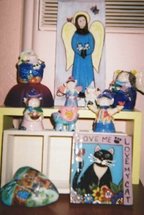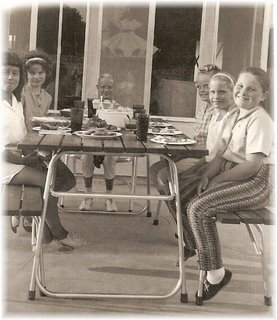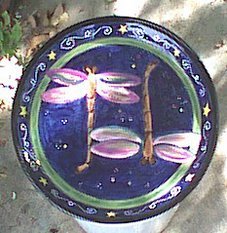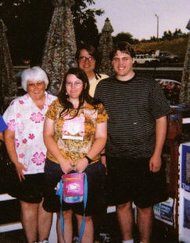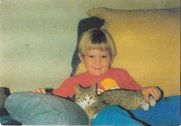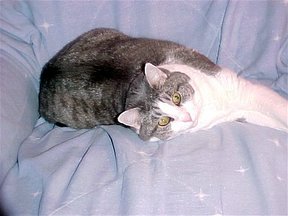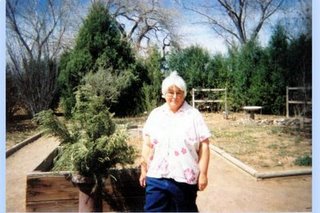I recently entered the Roswell Reads Essay contest and won 1st place in the Senior Division.
The Wall by John Hersey
I was born in Burbank, California in 1951 and lived there for 30 years. I grew up in the wake of World War II . When I was around 13 years old a friend, who was a few years older than myself, loaned me a book about Auschwitz. My father didn't want me to read it, but I read it anyway. It haunted me. A few years later another friend showed me the photos in the book "The Rise and Fall of the 3rd Reich" For the rest of my life those photos would haunt me.
When I was in the 10th grade, European History was a required subject. Although we studied WW2 there was nothing about the Holocaust in any of the books we read.
I went to school with many Jewish kids and had several Jewish friends. My orchestra teacher had a number tattooed on his arm and one student told me our teacher had been in a 'camp'. My grandfather met a man who had had all of his fingers broken by the Nazi's. My mother had some friends who lost their entire family because of the Germans and they refused to even ride in a Volkswagon. My high school boyfriend's grandmother survived the war by hiding in the forest. The Danish foreign exchange student told me how the Danes had NOT turned in the Jews but had smuggled them into Sweden. Sweden was 'Neutral' and the Jews were safe there.
It wasn't until I had a car, a job and some money that I began to buy books about the Holocaust and read the things that had happened. I read Anne Frank, The Hiding Place, Treblinka, Babi Yar, Voyage of the Damned and more. I couldn't believe that all of these horrible things had happened and no one had stopped it. Why didn't the Jews fight back? Why didn't people stand up to the Nazi's and demand they stop what they were doing? Being young and naive I thought it was all so simple.
After I read John Hersey's "The Wall", I had a deeper understanding of how the Holocaust happened and why people did the things they did or did not do. I read this book when I was in my late 20's and since then I have not stopped asking myself what I would have done if I was in that situation.
When I was single and had no children I was certain that I would have joined the resistance. But after I married and had children of my own my thoughts on that changed. What would I have done if Gestopo Officers stormed into my house in the middle of the night and shot one of my children? Would I fight back and risk them killing us all? Or would I go quietly with them? Would I sneak out of the Ghetto and steal food for my family, risking deportation of my entire building? How much 'fight' would I have in me if I were cold, sick and starving?
Whenever I have a bad cold or the flu I think of those Jews in the Ghettos and the camps, starving, no coats, no heat in the winter, doing hard labor even though they had typhus or pneumonia.
"The Wall" also brought home to me how much the Polish people despised the Jews. For a jar of jam a Pole would turn in a Jewish friend or neighbor. Of all the countries Poland exterminated the most Jews. Almost every Jew in Poland was killed. The Wall certainly colored my feelings towards not only Germany but also Poland and other Eastern European countries.
Many of the Jews were wealthy and the Nazi's took everything they had, jewelry, art, antiques, and furniture. Even now, when I see 'European Antiques' I wonder whom they had belonged to and were they taken from Jews.
If I were not a Jew, but a Pole, would I have risked my life and probably the lives of my family and maybe my friends, to help the Jews in the Ghetto? I like to think that I would, but who really knows until they are in that situation?
I thought of my Jewish friends and found it inconceivable that they would have been murdered simply because of their ethnic background.
After reading "The Wall" I began to pay closer attention to world politics and felt that surely the Holocaust was an isolated event. But as time goes on I see that is not the case. Stalin's purges, Pol Pot and Khmer Rouge, Bosnia, Rwanda, Darfur and other acts of genocide are still happening today.
When I think of "The Wall" I wonder how people can treat other people so horribly or at the very least stand by and do nothing. How can other people deny the Holocaust when there is so much documentation?
Because The Wall was based on the real-life diaries of Emanuel Ringelblum I was able to empathize with the characters. It made me really explore my inner feelings and think about what it would be like to step over dead bodies in the street each day, to see my friends and family deported and never know what happened to them. To ponder what it must have felt like to live in that over crowded Ghetto and then to finally be some of the last ones left, to be walking down empty deserted streets and waiting for them to come for me? What must if feel like to be the only person in your entire family to survive? After reading this book I did have some nightmares where I was being hunted by the German's.
"The Wall" also made me realize how very lucky I am to live where I live and for all the freedoms and rights that are so often taken for granted. It makes me understand why people risk their lives to come to this country. Or to leave their own country.
Although I read this book over 25 years ago the events described in it are still vivid and have inspired me to make regular contributions to Morris Dees, The Holocaust Museum and The Simon Wiesenthal Center.
In conclusion I can not think about the Wall without remembering George Santayana's famous quote "those who do not remember the past are doomed to repeat it".
Tuesday, September 18, 2007
Thursday, February 01, 2007

On January 2, 2007 I went looking for my cat, Belle and couldn't find her. Later that day I found her dead in my pottery studio. She had turned up as a stray in April 2006 and I had her spayed and she got her shots and I tried to let her come in the house, but she just would NOT leave my other two cats alone. Misty and Milo are both almost 14 years old and Belle would stalk them and then attack. So she had to stay outside. She had a nice yard, with lots of trees and a Gazebo to sleep in. When the weather turned cold she had my studio to stay in and when it was REALLY cold I would turn on the kiln to keep her warm. But she did like to travel around the neighborhood and she was somewhat high strung. I felt so very sad when she died and I wrote the following poem.
Sunday, July 09, 2006
This is a Birthday Party for my long time friend, Cindy. She is the one in the center.
I am the one on the front right hand side.
Look at those ugly pants!!
I'm guessing this was around 1959? As I recall, I had some Silly Putty with me and I didn't know what to do with it. I put it under the rubberband on my ponytail and it melted in the hot California sun and my mom had to cut it all out of my hair.
THE TIMES OF OUR LIVES!!!!!!!!
I am the one on the front right hand side.
Look at those ugly pants!!
I'm guessing this was around 1959? As I recall, I had some Silly Putty with me and I didn't know what to do with it. I put it under the rubberband on my ponytail and it melted in the hot California sun and my mom had to cut it all out of my hair.
THE TIMES OF OUR LIVES!!!!!!!!

Tuesday, May 16, 2006
Subscribe to:
Comments (Atom)
